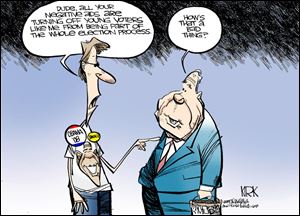
Reformers remorse
9/16/2008
WHEN Newt Gingrich was peddling his Contract With America in the mid-1990s, term limits were one of his central tenets of reform, and voters in many states and communities around the country became mesmerized by the idea and got the change they wanted.
Now, 14 years later, it doesn t seem like such a good idea.
As the New York Times reported recently, a number of local governments are suffering from a case of buyer s remorse. In some places, public officials who supported term limits are now arguing against them.
The problem is the one predicted by those who remained cautious at the time: Having experienced hands is important to the business of governing but periodic, mandated turnovers have the unhappy effect of kicking out officials when they have finally mastered the job. That translates into very little accountability, as one departing mayor said.
At the state level, Ohio has seen opportunistic politicians take advantage of term limits to push flashy legislative proposals, like tax cuts, which they won t be around to answer for in years to come. We ve also seen the dumbing down of the General Assembly, where a lack of skill and institutional memory on the part of short-timers has shifted power to staff members and lobbyists.
To be sure, term limits have worked effectively for executive positions such as president and governor, positions that could turn into autocratic platforms if they were not turned over every few years. But the legislative branch is different; it is the engine room where it helps to have some skilled mechanics.
If those mechanics are putting a monkey wrench into the works, the power of the people can set that straight. Elections are the perfect antidote to politicians who ve overstayed their welcome.
Term limits, as proposed in the 1990s, were a gimmick, and no gimmick is as good as responsible voters doing their duty.